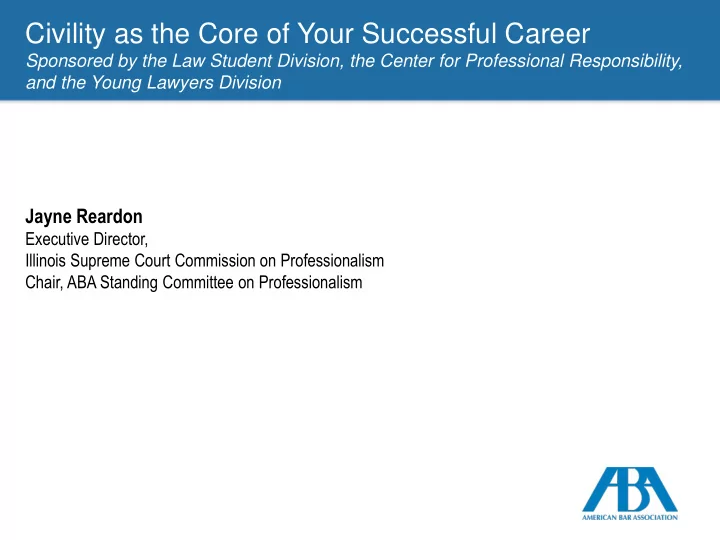

Civility as the Core of Your Successful Career Sponsored by the Law Student Division, the Center for Professional Responsibility, and the Young Lawyers Division Jayne Reardon Executive Director, Illinois Supreme Court Commission on Professionalism Chair, ABA Standing Committee on Professionalism www.americanbar.org | www.abacle.org
Join the ABA Law Student Division abaforlawstudents.com/gopremium Join For Free ✓ Network with 5 free practice specialty groups ( including Family Law ) ✓ 3-month Quimbee subscription ✓ Student Lawyer magazine Or Go Premium ✓ $250 off BARBRI Bar Review ✓ $25 off at West Academic ✓ Professional Ethics Bundle ✓ Professional Responsibility Bundle [$60 Value] ✓ Free Resume Review www.americanbar.org | www.abacle.org
2014 Survey of Illinois Lawyers With 91% of survey respondents describing their colleagues as civil/professional or very civil/professional , the overall climate of the profession appears to be that of civility. However, incidents of “bad behavior” are not uncommon. 85% experienced uncivil or unprofessional behavior in the last 6 months Survey Of Illinois Lawyers 2014 Illinois Supreme Court Commission on Professionalism
2014 Survey of Illinois Lawyers 9% Experienced Prejudice* 38% Experienced Rudeness* 51% Experienced Strategic Incivility* *of those who experienced incivility in the last 6 months Survey Of Illinois Lawyers 2014 Illinois Supreme Court Commission on Professionalism
2014 Survey of Illinois Lawyers In our survey, an overwhelming majority of Illinois lawyers acknowledge that the consequences of incivility include: Makes it more difficult to resolve a matter (94%) Makes practice of law less satisfying (92%) Harms public confidence in judicial system (91%) Leads to increased litigation costs (89%) Tends to prolong discovery/negotiations (88%) Discourages diversity in the profession (51%) Survey Of Illinois Lawyers 2014 Illinois Supreme Court Commission on Professionalism
relating to citizens exhibiting good behavior for the good of a community private virtue and a public necessity Civil Rights
Civil ility ity, , Professio ssionali lism sm, , Inclu lusio sion and Resili lience ce
1.Treat all of your co-workers with respect 2.Listen first 3.Avoid negative talk about others 4.Maintain a positive attitude 5.Treat more senior lawyers as your clients
6. Remember you are the new person 7. Project confidence, not arrogance 8. Always follow the ethical path 9. Protect your reputation 10.Find a mentor
Conflict is Constant What is your default approach to conflict? Accommodate Attack Avoid
Civil Conversations = Respectful Conversations Show Respect for others by Listening to understand Show respect for others by Reframing your conversations Show respect for yourself by Refraining from taking the bait
Reframe the Conversation Reframe your own words. Replace “but” with “and”.
Skill Practice: Reframing Your Words “The first five pages are very good, BUT the writing and organization deteriorate after that.” “I would like to grant your request for a day off, BUT we need all hands on deck for the partner’s retreat.” “I know your anniversary is tonight, BUT you need to stay here late to close this deal .” “I know you said your client is unavailable, BUT rescheduling him to Monday is unacceptable .” “I want to staff you on this case, BUT you do not have enough experience.”
Don’t Take the Bait Don’t write angry Don’t hit “Send” Review and reflect Picture as exhibit Take a break
Hypothetical #1: You receive an email from opposing counsel who represents a client with the same last name as you. Upon opening the email, you realize that it’s meant for the opposing party. The email states: “Deep, please review ASAP. The attached document outlines the reasons we could very well lose this case to Karen, as well as our previously- discussed settlement strategy.” What should you do? 1. Delete the email immediately. 2. Forward back the email without opening the attachment. 3. Read the attachment and delete the email. 4. Read the attachment and notify opposing counsel of the misdirected email. 5. Call opposing counsel and ask him what to do.
H YPOTHETICAL #2 You arrive in court for a discovery motion. During his argument, opposing counsel misrepresents compliance. During your rebuttal, he mutters a condescending remark that you can clearly hear but the judge cannot. What should you do? 1. Ask the judge to have counsel repeat the remark. 2. Ask counsel to repeat the remark and ask the judge to rule on the propriety of the remark. 3. Say nothing and continue with your rebuttal. 4. Tell counsel to stop interrupting you. 5. Ask the judge to direct counsel to stop talking during your rebuttal
Illinoi inois Supr preme me Cour urt t Commi mission ssion on Profes essionali sionalism Two Prudential Plaza Suite 1950 180 N. Stetson Avenue Chicago, IL 60601 312-363-6210 mail@2civility.org www.2civility.org
Recommend
More recommend